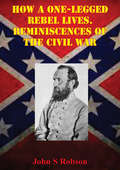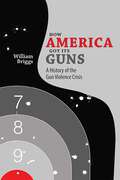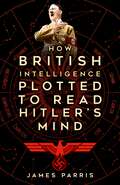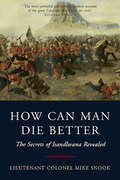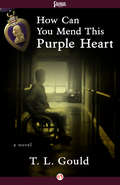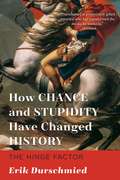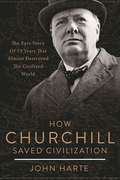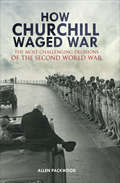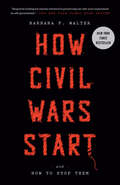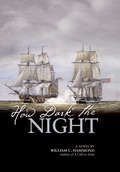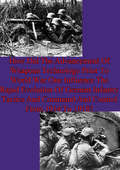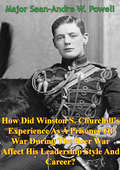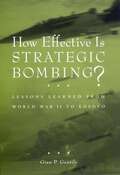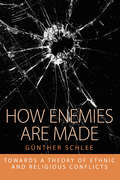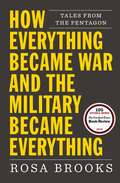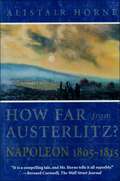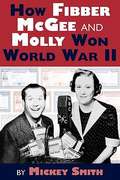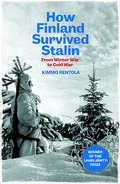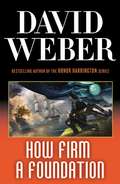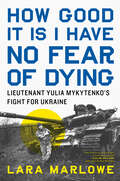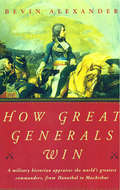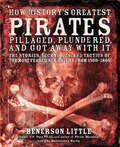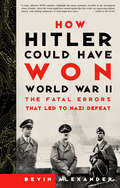- Table View
- List View
How A One-Legged Rebel Lives. Reminiscences Of The Civil War: The Story Of The Campaigns Of Stonewall Jackson, Told By A High Private In The “Foot Cavalry”
by John S RobsonA veteran of the 52nd Virginia Regiment recounts his experiences under the great Stonewall Jackson in his Valley campaign and up until he lost his leg for the Southern cause at the battle of Cedar Creek.
How America Got Its Guns: A History of the Gun Violence Crisis
by William BriggsIn the United States more than thirty thousand deaths each year can be attributed to firearms. This book on the history of guns in America examines the Second Amendment and the laws and court cases it has spawned. The author&’s thorough and objective account shows the complexities of the issue, which are so often reduced to bumper-sticker slogans, and suggests ways in which gun violence in this country can be reduced.Briggs profiles not only protagonists in the national gun debate but also ordinary people, showing the ways guns have become part of the lives of many Americans. Among them are gays and lesbians, women, competitive trapshooters, people in the gun-rights and gun-control trenches, the NRA&’s first female president, and the most successful gunsmith in American history.Balanced and painstakingly unbiased, Briggs&’s account provides the background needed to follow gun politics in America and to understand the gun culture in which we are likely to live for the foreseeable future.
How British Intelligence Plotted to Read Hitler's Mind: How British Intelligence Plotted to Read Hitler's Mind
by James ParrisIn the darkest days of the Second World War, as Europe fell under Nazi domination and Britain faced invasion, Louis de Wohl, a 36-year-old refugee from Germany, made a curious offer to British Intelligence. Based on the widely held belief that Hitler’s every action was guided by his horoscope, de Wohl claimed he could reveal precisely what advice the Führer’s astrologers were giving him.Rather than dismissing de Wohl out of hand as a crank, senior intelligence officers and chiefs of staff of the three armed services took him at his word. De Wohl was made an army captain and quartered in the Grosvenor House Hotel, from where his one-man ‘Psychological Research Bureau’ passed astrological readings and assessments to the War Office, before his deployment to the United States by the highly secret Special Operations Executive on a propaganda mission.Was it possible that Military and Naval intelligence officers could take the ancient and arcane practice of astrology seriously? Was de Wohl genuine or merely a charlatan? Did his astrological readings contribute to the downfall of Hitler and Nazi Germany?In How British Intelligence Plotted to Read Hitler’s Mind, the first fulllength study of Louis de Wohl, James Parris examines the evidence – including material from MI5, Military and Naval Intelligence files at the National Archives – and reaches remarkable conclusions about this bizarre aspect of the Second World War.
How Can Burundi Raise Its Growth Rate?
by Olivier BasdevantA report from the International Monetary Fund.
How Can Man Die Better: The Secrets of Isandlwana Revealed
by Mike SnookWednesday 22 January 1879 was one of the most dramatic days in the long and distinguished history of the British Army. At noon a massive Zulu host attacked the 24th Regiment in its encampment at the foot of the mountain of Isandlwana, a distinctive feature that bore an eerie resemblance to the Sphinx badge of the outnumbered redcoats. Disaster ensued. Later that afternoon the victorious Zulus would strike the tiny British garrison at Rorkes Drift. How Can Man Die Better is a unique analysis of Isandlwana of the weapons, tactics, ground, and the intriguing characters who made the key military decisions. Because the fatal loss was so high on the British side there is still much that is unknown about the battle. This is a work of unparalleled depth, which eschews the commonly held perception that the British collapse was sudden and that the 24th Regiment was quickly overwhelmed. Rather, there was a protracted and heroic defence against a determined and equally heroic foe. The author reconstructs the final phase of the battle in a way that has never been attempted before. It was to become the stuff of legend, which brings to life so vividly the fear and smell the blood.
How Can You Mend This Purple Heart
by T. L. GouldWinner of the Marine Corps Heritage Foundation's James Webb Award for distinguished fiction In this riveting first novel, author T. L. Gould draws on his experiences in a military hospital with severely wounded Marines recovering from the Vietnam War. He has created a plain-truth, no-holds-barred narrative, stark in its simplicity, detail, and humor. From dressing changes and morphine drips to off-site forays under a fence and into neighborhood bars and brothels, Gould chronicles the precipitous journey to recovery of the men of Ward 2B: how they learned to walk again, to love again, and to triumph over crippling injuries. How Can You Mend This Purple Heart is not a story about combat in the jungles of Vietnam. It is a story about boys who returned from combat as men--men who left the better part of their youth, a bit of their souls, and a lot of their flesh in a battlefield on the other side of the world. It's a story about their longing to recapture the spirit of boyhood and rekindle the optimism and fearlessness of youth. And it's about their struggle to be whole again--or at the very least, to feel whole. It chronicles a journey of love, redemption, sorrow, and joy; a journey of pain and anger . . . and a journey of hope. But most of all, a journey of the human spirit and its triumph over the most impossible odds. How Can You Mend This Purple Heart is a tribute to all the combat-wounded veterans of past and present conflicts. May they find the strength to continue their lives' missions and know that the entire nation is grateful for their sacrifices.
How Chance and Stupidity Have Changed History: The Hinge Factor
by Erik DurschmiedFrom the Trojan Horse to a photograph snapped in Vietnam, world history has been shaped as much by chance and error as by courage and heroism. Despite impossible odds, invincible armies fall in bitter defeat to weaker opponents. How and why does this happen? What decides the fate of battle? In this fascinating book, Erik Durschmied takes us through the major conflicts of history-from Agincourt to the Civil War, from Crimea to the Gulf War-and reveals how, in war, it is the improbable and the inconceivable that determine events.Writing with the style and flair that made him an award-winning war correspondent, Durschmied explores the fistful of nails that could have won Waterloo for Napoleon; the barrel of schnapps that proved disastrous for an Austrian emperor; and the three cigars that changes the course of Antietam; and many other instances when chance decided history’s path. Conflicts are decided by the caprice of weather, erroneous intelligence, unlikely heroism, strange coincidence, or individual incompetence-in short, by the unpredictable "hinge factor.”Skyhorse Publishing, as well as our Arcade imprint, are proud to publish a broad range of books for readers interested in history--books about World War II, the Third Reich, Hitler and his henchmen, the JFK assassination, conspiracies, the American Civil War, the American Revolution, gladiators, Vikings, ancient Rome, medieval times, the old West, and much more. While not every title we publish becomes a New York Times bestseller or a national bestseller, we are committed to books on subjects that are sometimes overlooked and to authors whose work might not otherwise find a home.
How Churchill Saved Civilization: The Epic Story of 13 Years That Almost Destroyed the Civilized World
by John HarteHow Churchill Saved Civilization resolves the lingering mysteries surrounding the causes of the Second World War, and what transpired during the war to bring its end result. It proposes answers to such questions as "Why were the Allies unprepared?", "Why did France collapse so quickly?", "Why didn't the British government accept Hitler's peace proposals?" and "Why did the Germans allow Hitler to obtain life and death control over them?"But the book's main purpose is to provide an account of Winston Churchill's actions and their intended consequences - as well as some of the unintended ones - for readers who are unlikely to read a military history book of 800 pages. The author has pared down the details of this at once fascinating and frightening story to an accessible length of how the world nearly ended in the 1940s. How Churchill Saved Civilization was written in honor of all those who sacrificed their lives in the War, and to caution readers that it could very easily happen again, as key factors like complacency, ignorance, and weakness continue to play a role in international diplomacy.Skyhorse Publishing, as well as our Arcade imprint, are proud to publish a broad range of books for readers interested in history--books about World War II, the Third Reich, Hitler and his henchmen, the JFK assassination, conspiracies, the American Civil War, the American Revolution, gladiators, Vikings, ancient Rome, medieval times, the old West, and much more. While not every title we publish becomes a New York Times bestseller or a national bestseller, we are committed to books on subjects that are sometimes overlooked and to authors whose work might not otherwise find a home.
How Churchill Waged War: The Most Challenging Decisions of the Second World War
by Allen PackwoodAn analytical investigation into Prime Minister Winston Churchill&’s decision-making process during every stage of World War II. When Winston Churchill accepted the position of Prime Minister in May 1940, he insisted in also becoming Minister of Defence. This, though, meant that he alone would be responsible for the success or failure of Britain&’s war effort. It also meant that he would be faced with many monumental challenges and utterly crucial decisions upon which the fate of Britain and the free world rested. With the limited resources available to the UK, Churchill had to pinpoint where his country&’s priorities lay. He had to respond to the collapse of France, decide if Britain should adopt a defensive or offensive strategy, choose if Egypt and the war in North Africa should take precedence over Singapore and the UK&’s empire in the East, determine how much support to give the Soviet Union, and how much power to give the United States in controlling the direction of the war. In this insightful investigation into Churchill&’s conduct during the Second World War, Allen Packwood, BA, MPhil (Cantab), FRHistS, the Director of the Churchill Archives Centre, enables the reader to share the agonies and uncertainties faced by Churchill at each crucial stage of the war. How Churchill responded to each challenge is analyzed in great detail and the conclusions Packwood draws are as uncompromising as those made by Britain&’s wartime leader as he negotiated his country through its darkest days.
How Civil Wars Start: And How to Stop Them
by Barbara F. WalterA leading political scientist examines the dramatic rise in violent extremism around the globe and sounds the alarm on the increasing likelihood of a second civil war in the United States. <p><p> Political violence rips apart several towns in southwest Texas. A far-right militia plots to kidnap the governor of Michigan and try her for treason. An armed mob of Trump supporters and conspiracy theorists storms the U.S. Capitol. Are these isolated incidents? Or is this the start of something bigger? Barbara F. Walter has spent her career studying civil conflict in places like Iraq and Sri Lanka, but now she has become increasingly worried about her own country. <p><p> Perhaps surprisingly, both autocracies and healthy democracies are largely immune from civil war; it’s the countries in the middle ground that are most vulnerable. And this is where more and more countries, including the United States, are finding themselves today. <p><p> Over the last two decades, the number of active civil wars around the world has almost doubled. Walter reveals the warning signs—where wars tend to start, who initiates them, what triggers them—and why some countries tip over into conflict while others remain stable. Drawing on the latest international research and lessons from over twenty countries, Walter identifies the crucial risk factors, from democratic backsliding to factionalization and the politics of resentment. A civil war today won’t look like America in the 1860s, Russia in the 1920s, or Spain in the 1930s. It will begin with sporadic acts of violence and terror, accelerated by social media. It will sneak up on us and leave us wondering how we could have been so blind. <p><p> In this urgent and insightful book, Walter redefines civil war for a new age, providing the framework we need to confront the danger we now face—and the knowledge to stop it before it’s too late.
How Dark the Night
by William C. HammondHow Dark the Night profiles the years 1805 to 1810, picking up where the fourth volume, A Call to Arms, ends. These years leading up to the War of 1812 are devastating ones for the young republic and for the Cutler family. The life-and-death struggle between the forces of Great Britain and France continue in Europe, and the United States is caught in a web of financial and political chaos as President Jefferson and Secretary of State Madison endeavor to keep the woefully unprepared United States out of the imbroglio while at the same time defending the nation's honor. On the home front, the embargo acts initiated by the government threaten the livelihood of the Cutler family and other New England shipping families as merchant ships rot on their moorings and sailors sit on the beach, penniless. What is far worse to the Cutler family, however, is a grave illness that threatens the life of its most beloved member.Historical figures profiled in How Dark the Night include the infamous pirate Jean Lafitte, Secretary of the Navy Robert Smith, Robert Fulton and his prototype for a submarine, Captain Stephen Decatur, Captain Salusbury Pryce Humphreys RN, and Commodore James Barron. Historical events include the decline of slavery in the West Indies, the stark political differences between the Federalists in New England and the "War Hawk" Republicans in the South and West led by Henry Clay and John Calhoun, and the abuses at sea perpetrated by the Royal Navy against American sailors. Such abominations reach a war footing after the so-called "affair" between the USS Chesapeake and HMS Leopard-as related from the British point of view through the eyes of Seth Cutler, a midshipman serving in Leopard.
How Did The Advancement Of Weapons Technology Prior To World War One: Influence The Rapid Evolution Of German Infantry Tactics And Command And Control From 1914 To 1918?
by Major Daniel T. LathropThe fact that there has been significant evolution in infantry tactics during the past century is taken for granted. Also, it is well documented that the predominant advancements in tactics took place between 1914 and 1918, during World War One, rooted within the German army. However, the cause and effect that initiated this rapid evolution is somewhat unclear. Was this advancement solely due to the inspiration of one or more German commanders of the time? Was this advancement in tactics a Revolution in Military Affairs? Or, was this merely an evolution in tactics resulting from advancements in fire power due to technology improvements in infantry weapons such as the machine gun, infantry rifle, field artillery, etc.Prior to World War I the German army had studied and toyed with new tactics off and on. By 1914 they were still practicing traditional tactics against the Allies. The use of these tactics against the massive destructive capability of modern weapons available to both sides at the start of the war caused enormous numbers of casualties. The German army, in comparison to the Allies, was limited in numbers of soldiers and material and could not afford to continue to keep up with the high attrition rate. Necessity being the mother of invention, the Germans acted aggressively in finding a way to defeat the advanced firepower that emerged during the war. Through experimentation and training they developed the famous "Storm Troops" that momentarily broke the deadlock near the end of the war. After World War I these new tactics were taken up by other forces around the world and eventually led to German Blitzkrieg tactics of World War Two.
How Did Winston S. Churchill’s Experience As A Prisoner Of War: During The Boer War Affect His Leadership Style And Career?
by Major Sean-Andre W. PowellThis thesis will examine how Churchill's experience in the Boer War affected his career and leadership style. Initial research revealed that Churchill planned to make some major life decisions in 1899 the year he participated in The Boer War. Fate and other variables such as his financial independence and celebrity status enabled rapid realization of his goals to attain political office in the British government. Research indicated that Churchill's experience while a Boer prisoner of war (POW) and his subsequent escape proved to be an especially formative experience for him professionally. In addition, his POW experience taught him the Boer perspective of the conflict, which developed his leadership and personality. Secondary questions answered are: How did his experience as a POW affect him? What did his experiences in Cuba, India, and Sudan teach him? What were Churchill's motivations during his time in the British Army? Using a chronological approach throughout this paper will provide the reader with the most logical and easiest method of answering these questions.
How Do We Know What Information Sharing Is Really Worth?: Exploring Methodologies to Measure the Value of Information Sharing and Fusion Efforts
by Brian A. JacksonHow Do We Know What Information Sharing Is Really Worth?: Exporing Methodologies to Measure the Value of Information Sharing and Fusion Efforts (Research Reports)
How Effective is Strategic Bombing?: Lessons Learned From World War II to Kosovo
by Gian P. GentileIn the wake of World War II, Secretary of War Henry L. Stimson and President Harry S. Truman established the U.S. Strategic Bombing Survey, to determine exactly how effectively strategic air power had been applied in the European theater and in the Pacific. The final study, consisting of over 330 separate reports and annexes, was staggering in its size and emphatic in its conclusions. As such it has for decades been used as an objective primary source and a guiding text, a veritable Bible for historians of air power. In this aggressively revisionist volume, Gian Gentile examines afresh this influential document to reveal how it reflected to its very foundation the American conceptual approach to strategic bombing. In the process, he exposes the survey as largely tautological and thereby throwing into question many of the central tenets of American air power philosophy and strategy. With a detailed chapter on the Gulf War and the resulting Gulf War Air Power Survey, and a concluding chapter on the lessons of the Kosovo air war, How Effective is Strategic Bombing? is the most comprehensive and important book on air power strategy in decades.
How Enemies Are Made
by Günther SchleeIn popular perception cultural differences or ethnic affiliation are factors that cause conflict or political fragmentation although this is not borne out by historical evidence. This book puts forward an alternative conflict theory. The author develops a decision theory which explains the conditions under which differing types of identification are preferred. Group identification is linked to competition for resources like water, territory, oil, political charges, or other advantages. Rivalry for resources can cause conflicts but it does not explain who takes whose side in a conflict situation. This book explores possibilities of reducing violent conflicts and ends with a case study, based on personal experience of the author, of conflict resolution.
How Everything Became War and the Military Became Everything: Tales from the Pentagon
by Rosa BrooksThe first serious book to examine what happens when the ancient boundary between war and peace is erased.Once, war was a temporary state of affairs--a violent but brief interlude between times of peace. Today, America's wars are everywhere and forever: our enemies change constantly and rarely wear uniforms, and virtually anything can become a weapon. As war expands, so does the role of the US military. Today, military personnel don't just "kill people and break stuff." Instead, they analyze computer code, train Afghan judges, build Ebola isolation wards, eavesdrop on electronic communications, develop soap operas, and patrol for pirates. You name it, the military does it. Rosa Brooks traces this seismic shift in how America wages war from an unconventional perspective--that of a former top Pentagon official who is the daughter of two anti-war protesters and a human rights activist married to an Army Green Beret. Her experiences lead her to an urgent warning: When the boundaries around war disappear, we risk destroying America's founding values and the laws and institutions we've built--and undermining the international rules and organizations that keep our world from sliding towards chaos. If Russia and China have recently grown bolder in their foreign adventures, it's no accident; US precedents have paved the way for the increasingly unconstrained use of military power by states around the globe. Meanwhile, we continue to pile new tasks onto the military, making it increasingly ill-prepared for the threats America will face in the years to come. By turns a memoir, a work of journalism, a scholarly exploration into history, anthropology and law, and a rallying cry, How Everything Became War and the Military Became Everything transforms the familiar into the alien, showing us that the culture we inhabit is reshaping us in ways we may suspect, but don't really understand. It's the kind of book that will leave you moved, astonished, and profoundly disturbed, for the world around us is quietly changing beyond recognition--and time is running out to make things right.
How Far from Austerlitz?: Napoleon 1805–1815
by Alistair HorneA London Sunday Times Book of the YearA Daily Telegraph Book of the YearAlistair Horne explores the theme of military success and failure in How Far From Austerlitz? chronicling Napoleon's rise and fall, drawing parallels with other great leaders of the modern era. The Battle of Austerlitz was Napoleon's greatest victory, the culmination of one of the greatest military campaigns of all time. It was also the last battle the "Father of Modern Warfare" would leave in absolute triumph, for, though he did not know it, Austerlitz marked the beginning of Napoleon's downfall. His triumph was too complete and his conquest too brutal to last. Like Hitler, he came to believe he was invincible, that no force could halt his bloody march across Europe. Like Hitler, he paid dearly for his hubris, climaxing in bitter defeat at Waterloo in 1815. In a matter of years, he had fallen from grace.
How Fibber Mcgee and Molly Won World War II
by Mickey C. SmithA detailed account with notes about the Fibber McGee and Molly show and its relationship to the Johnson wax company during World War II.
How Finland Survived Stalin: From Winter War to Cold War, 1939-1950
by Kimmo RentolaA dramatic and timely account of Stalin&’s failed invasion of Finland in 1939, and the decade of wars and fraught relations that followed In November 1939, Stalin directed his military leaders to launch an invasion of Finland. In what became known as the Winter War, the full might of the Soviet army was pitted against this small Nordic republic. Yet despite their vastly superior military strength, the Soviets suffered heavy losses and failed to mount Stalin&’s intended full-scale invasion. How did Finland evade Stalin&’s crosshairs—not once, but three times more? In this groundbreaking account, Kimmo Rentola traces the epochal shifts in Soviet-Finnish relations. From the Winter War to Finland&’s exit from World War II in 1944, a possible Soviet-backed coup in 1948, and Moscow&’s designation of Finland as an enemy state in 1950, Finland was forced to navigate Stalin&’s outsize political and territorial demands. Rentola presents a dramatic reconstruction of Finland&’s unlikely survival at a time when the nation&’s very existence was at stake.
How Firm a Foundation (Safehold #5)
by David Weber[Proofreader's Note: There's no Table of Contents, so the reader is not informed that there is a complete 27-page detailed Cast of Characters, and an extensive glossary at the end of the book. The Glossary would be especially helpful to read in advance and use along the way while reading this 600 page book.] The Charisian Empire, born in war, has always known it must fight for its very survival. What most of its subjects don't know even now, however, is how much more it's fighting for. Emperor Cayleb, Empress Sharleyan, Merlin Athrawes, and their innermost circle of most trusted advisers do know. And because they do, they know the penalty if they lose will be far worse than their own deaths and the destruction of all they know and love. For five years, Charis has survived all the Church of God Awaiting and the corrupt men who control it have thrown at the island empire. The price has been high and paid in blood. Despite its chain of hard-fought naval victories, Charis is still on the defensive. It can hold its own at sea, but if it is to survive, it must defeat the Church upon its own ground. Yet how does it invade the mainland and take the war to a foe whose population outnumbers its own fifteen to one? How does it prevent that massive opponent from rebuilding its fleets and attacking yet again? Charis has no answer to those questions, but needs to find one...quickly. The Inquisition's brutal torture and hideous executions are claiming more and more innocent lives. Its agents are fomenting rebellion against the only mainland realms sympathetic to Charis. Religious terrorists have been dispatched to wreak havoc against the Empire's subjects. Assassins stalk the Emperor and Empress, their allies and advisers, and an innocent young boy, not yet eleven years old, whose father has already been murdered. And Merlin Athrawes, the cybernetic avatar of a young woman a thousand years dead, has finally learned what sleeps beneath the far-off Temple in the Church of God Awaiting's city of Zion. The men and women fighting for human freedom and tolerance have built a foundation for their struggle in the Empire of Charis with their own blood, but will that foundation be firm enough to survive?
How Good It Is I Have No Fear of Dying: Lieutenant Yulia Mykytenko's Fight for Ukraine
by Lara MarlowePublishing on the third anniversary of the war in Ukraine: The gripping, heartrending story, told in her own words, of a formidable 29-year-old woman serving as a commander on the front lines of the War in Ukraine — and an intimate, hair-raising look at modern warfare . . .Lieutenant Yulia Mykytenko, a commander in the Ukrainian army serving on the front line of battle, embodies her country's resistance to the Russian invasion. When her father self-immolated on Maidan Square in central Kyiv in an act of protest, she held a press conference to explain to journalists that he acted &“in sound mind.&” Later, in battle on the front line, she would learn via radio-phone that her husband had been killed nearby.In 2023, veteran war correspondent Lara Marlowe met Mykytenko while covering the war, and found her to be &“one of the most extraordinary people I have interviewed in 42 years of journalism.&” From their months of conversations, Marlowe stitched together Mykytenko&’s accounts into a riveting revelation of what modern warfare is really like.Told entirely in Mykytenko's first person voice, it is a story of cluster bombs and ballistic missiles. Mykytenko has most recently commanded a drone unit, and the scenes of launching drone attacks, and of being attacked by drones, are electrifying and harrowing. At the same time there are vestiges of WWII: trench warfare, no-man&’s lands seeded with mines, even chemical weapons.The result is an urgent story of a besieged nation, a vivid look at the changing face of warfare, and the stirring tale of an inspirational woman fighting for her country's survival.
How Great Generals Win
by Bevin Alexander"An astute military historian's appraisal of what separates the sheep from the wolves in the great game of war."--Kirkus Reviews If a key to military victory is to "get there first with the most," the true test of the great general is to decide where "there" is--the enemy's Achilles heel. Here is a narrative account of decisive engagements that succeeded by brilliant strategy more than by direct force. The reader accompanies those who fought, from Roman legionaries and Mongol horsemen to Napoleonic soldiery, American Civil War Rebels and Yankees, World War I Tommies, Lawrence of Arabia's bedouins, Chinese revolutionaries, British Desert Rats, Rommel's Afrika Korps, and Douglas MacArthur's Inchon invaders. However varied their weapons, the soldiers of all these eras followed a commander who faced the same obstacles and demonstrated the strategic and tactical genius essential for victory. "All warfare is based on deception," wrote Sun Tzu in The Art of War in 400 BCE. Bevin Alexander shows how great generals have interpreted this advice, and why it still holds true today.
How History's Greatest Pirates Pillaged, Plundered, and Got Away With It: The Stories, Techniques, and Tactics of the Most Feared Sea Rovers from 1500–1800
by Benerson LittleWho were the world’s most successful pirates, and why? “Interesting and very readable . . . Little clearly knows his subject well.” —International Journal of Naval HistoryMore than just simple retellings of tried-and-true stories of buccaneers on the high seas, this book focuses on pirating tactics of the 1500s through the 1800s to give an in-depth view of how pirates functioned through history. Stories of the thirteen most famous pirates as they raid major ships and pillage coastal villages reveal how the pirates approached such invasions—and how they managed to elude authorities and sometimes whole navies. In addition, vivid firsthand descriptions recreate the excitement, fear, and fury of the most famous raids by these outlaws of the ocean. Delving deep to show piracy’s profound impact on trade, politics, military strategy, culture, and individual lives, the book sifts truth from myth, carefully reconstructs the geopolitical context of each story, and analyzes the tactics that brought the pirates glory, or led to their downfall. Also included are archival images gathered from around the world by the author, a former Navy SEAL and consultant on maritime security.
How Hitler Could Have Won World War II: The Fatal Errors That Led to Nazi Defeat
by Bevin AlexanderMost of us rally around the glory of the Allies' victory over the Nazis in World War II. The story is often told of how the good fight was won by an astonishing array of manpower and stunning tactics. However, what is often overlooked is how the intersection between Adolf Hitler's influential personality and his military strategy was critical in causing Germany to lose the war. With an acute eye for detail and his use of clear prose, acclaimed military historian Bevin Alexander goes beyond counterfactual "What if?" history and explores for the first time just how close the Allies were to losing the war. Using beautifully detailed, newly designed maps, How Hitler Could Have Won World War II exquisitely illustrates the important battles and how certain key movements and mistakes by Germany were crucial in determining the war's outcome. Alexander's harrowing study shows how only minor tactical changes in Hitler's military approach could have changed the world we live in today. How Hitler Could Have Won World War II untangles some of the war's most confounding strategic questions, such as: Why didn't the Nazis concentrate their enormous military power on the only three beaches upon which the Allies could launch their attack into Europe? Why did the terrifying German panzers, on the brink of driving the British army into the sea in May 1940, halt their advance and allow the British to regroup and evacuate at Dunkirk?With the chance to cut off the Soviet lifeline of oil, and therefore any hope of Allied victory from the east, why did Hitler insist on dividing and weakening his army, which ultimately led to the horrible battle of Stalingrad?Ultimately, Alexander probes deeply into the crucial intersection between Hitler's psyche and military strategy and how his paranoia fatally overwhelmed his acute political shrewdness to answer the most terrifying question: Just how close were the Nazis to victory? Why did Hitler insist on terror bombing London in the late summer of 1940, when the German air force was on the verge of destroying all of the RAF sector stations, England's last defense?With the opportunity to drive the British out of Egypt and the Suez Canal and occupy all of the Middle East, therefore opening a Nazi door to the vast oil resources of the region, why did Hitler fail to move in just a few panzer divisions to handle such an easy but crucial maneuver?On the verge of a last monumental effort and concentration of German power to seize Moscow and end Stalin's grip over the Eastern front, why did the Nazis divert their strength to bring about the far less important surrender of Kiev, thereby destroying any chance of ever conquering the Soviets? "Bevin Alexander, an experienced military historian who writes with clarity and alarm, here presents a new and insightful interpretation of Hitler's lost opportunities to win World War II. In the process Alexander gives us a concise history of the war in Europe. "-- Martin Blumenson, author of The Patton Papers and Patton: The Man Behind the Legend"In his latest book, How Hitler Could Have Won World War II, author Bevin Alexander has synthesized and analyzed the military campaigns by Germany under Hitler's control in such a readable fashion as to intrigue both armchair generals as well as serious students of military strategy and tactics. It should be a required text for study at all military schools and war colleges. "-- Thomas H. Moorer, Admiral, U. S. Navy (Ret. ), former chairman, U. S. Joint chiefs of Staff"Speculation is the handmaiden of a historian's search for a story of the past. . . . Bevin Alexander has compiled his 'What if?'s' into a fascinating, plausible and, in retrospect, alarming scenario of what might have been if only Hitler had been a bit more rational, a bit better at grand strategy. "-- F. J. Kroesen, former commander-in-chief, U. S. Army-Europe, and commander, NATO Central Army Group
